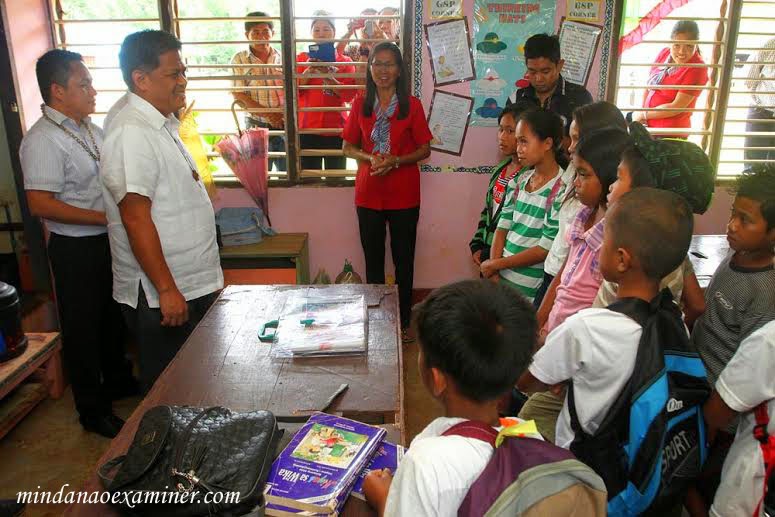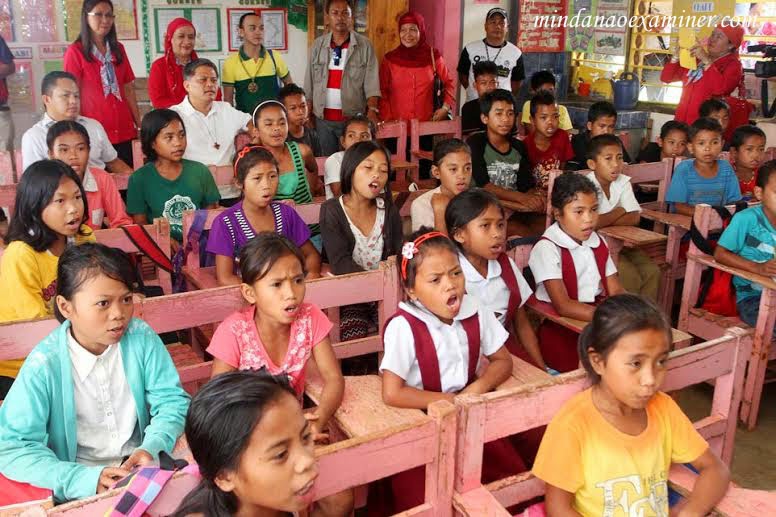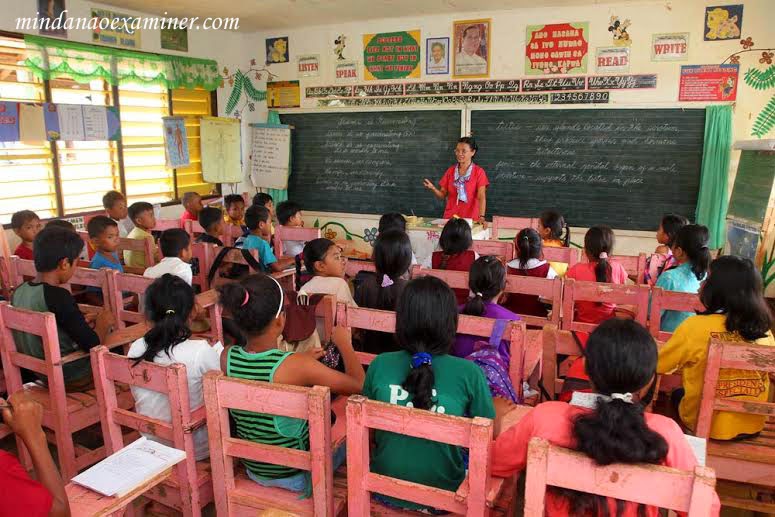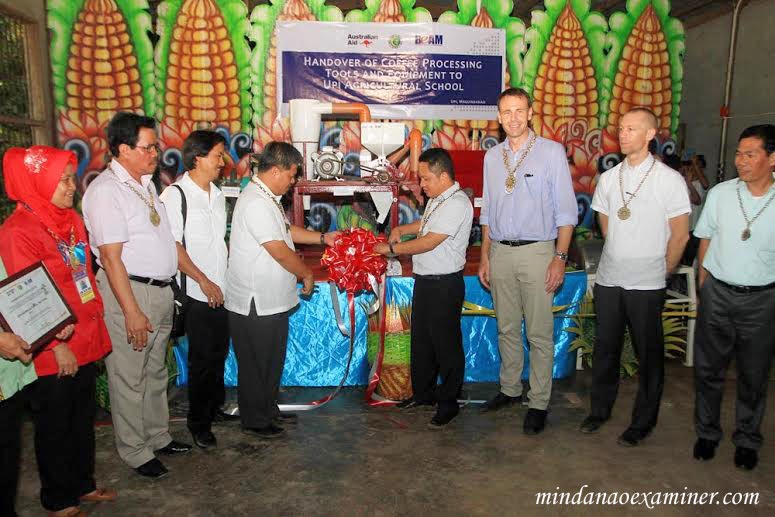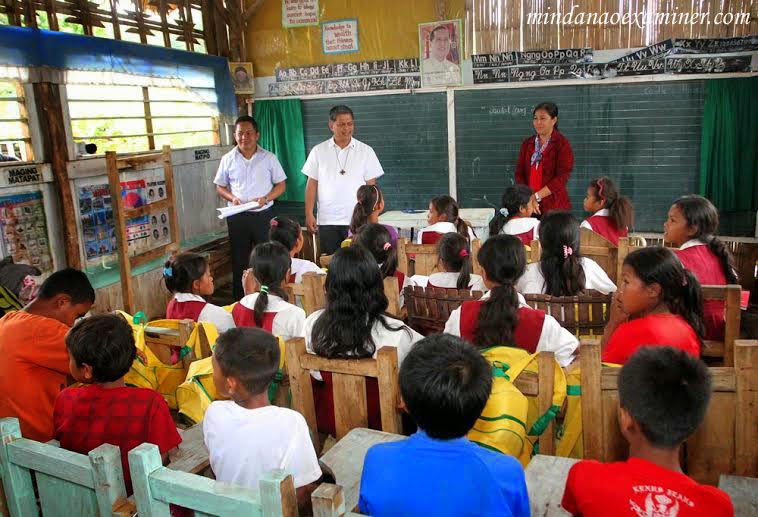
Department of Education Secretary Armin Luistro and Regional Education Secretary Jamar Kulayan, of the Autonomous Region in Muslim Mindanao, inspect the opening of classes in the town of South Upi in Maguindanao province. Many school rooms in the predominantly Teduray town are made of bamboo. The Department of Education in partnership with Australian Aid-Basic Education Assistance for Mindanao are building at least 9 schools and are also renovating five classrooms in the area. (Mindanao Examiner Photo – Mark Navales)
COTABATO CITY (Mindanao Examiner / June 3, 2014) – BRAC Philippines in partnership with the Department of Education and Australian Government formally opened Monday some 1,200 learning centers in five provinces in the Autonomous Region in Muslim Mindanao.
And along with the free education and the free learning materials, all students in BRAC Learning Centers were also provided with essential hygienic materials such toothbrush with polypaste fluoride and soap for hand washing as part of their daily school activities.
Department of Education Secretary Armin Luistro and Regional Education Secretary Jamar Kulayan also inspected the opening of classes in Maguindanao’s South Upi town and mingled with students. The Department of Education in partnership with Australian Aid-Basic Education Assistance for Mindanao (BEAM) are building at least 9 schools and are also renovating five classrooms in the area. Aus-Aid also handed over coffee processing tools and equipment to Luistro and Kulayan for Upi Agricultural School.
Operating through the remotest areas of ARMM, BRAC Philippines through the Alternative Delivery Model Project of Basic Education Assistance for Muslim Mindanao Program provides alternative quality education to more or less 40,000 out of school children from the disadvantaged communities of the region.
In Maguindanao, Lanao Del Sur, Tawi-Tawi, Sulu and Basilan, a total of 488 kindergartens and 203 Grade 1, including 411 Grade 2 and 118 Grade 3 are now operational. This is on top of the 312 learning centers in Maguindanao; 619 in Lanao del Sur and 118 more in Tawi-Tawi. Sulu and Basilan provinces have 108 and 78 learning centers respectively.
BRAC Philippines established learning centers in remote and deprived villages of ARMM where access to primary education is difficult for many children like absence of schools, conflict and unstable condition, inadequate transportation facilities and low family income.
The project trailing the value of inclusiveness aims to cover more school-less barangays in the most underprivileged communities in the hope to lessen the illiteracy rate not only in ARMM, but other areas of the country.
The charitable foundation (Stichting) BRAC International in The Hague was formed on March 16, 2009 and is actively involved in development programs such as health, education, agriculture, livelihoods, targeting the poor, human rights and legal services programmes.
Aside from the Philippines, BRAC International has also programs in Afghanistan, Sri Lanka, Pakistan, Uganda, Tanzania, South Sudan, Sierra Leone, Liberia and Haiti.
On the hand, Australia is continuing its support to improve the delivery of basic education to Muslim school children in ARMM through the BEAM. Just this year, the Australian Agency for International Development inaugurated a building it funded for the Department of Education-ARMM.
The new building will bring together the financial and human resource management of Department of Education-ARMM and the project office of the BEAM program under one roof. This will substantially improve the policy development and planning in education for ARMM.
The BEAM-ARMM, a six year education program of Department of Education (ARMM) under lawyer Jamar Kulayan in partnership with AusAID, aims to benefit over 500,000 children in the region and help construct new classrooms, science laboratories, and school libraries; provide schools with water and sanitation facilities and learning materials; and improve quality of teaching by training teachers.
It targets the most disadvantaged children in 300 villages without public schools. The program will cover both public and private madaris and will also provide employment-related skills training for 20,000 out-of-school youth to equip them to better access economic opportunities. (Mark Navales and J. Magtanggol)

